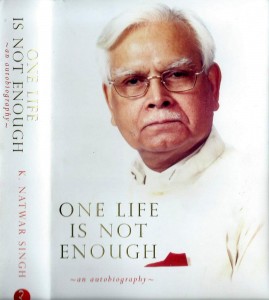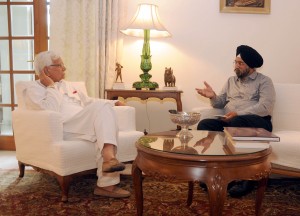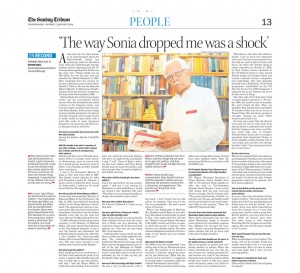A MAN who was for years known to be closemouthed about the Nehru-Gandhi family has opened up, and how. His latest book, ‘One Life is Not Enough’, has the political classes chattering and the TV viewing classes getting their thrills over the ‘juicy bits’. Natwar Singh was an IFS officer for over 33 years, who was awarded the Padma Bhushan in 1984. After resigning from the service, he became a politician and served in Rajiv Gandhi’s Cabinet. He was the External Affairs Minister in Manmohan Singh’s Cabinet till he was named in a report on the Iraq oil-for-food scandal in 2005.
Natwar Singh has written many books earlier, but his just-released tell-all account of his life and politics has raised a furore in the Congress circles, and even provoked a reaction from the reticent Sonia Gandhi. At 83, he has a sharp memory and the perspective of a person who had a ringside view of major events in India, which he pens down with a quill that seeks to undo ‘perceived injustices’ as he gives his side of the story. Excerpts from an interview:
 Your book is more about your political journey and less about you as a person. I expected a little more of you in it.
Your book is more about your political journey and less about you as a person. I expected a little more of you in it.
I think that the reader should be grateful for it.
When did you conceive of the book? What was your primary intent in writing this book?
I conceived of the book in 2010. I started writing in earnest at the end of 2011. I worked hard on it. I revise a great deal, for literary style, historical perspective. I worked hard, and on the whole I think that is has worked quite well.
Did you have a roadmap when you started off with the book?
No. the opening line of my preface is that life is a journey without maps. As it came along, things happened. I have a good memory, not a freakish one, but a good one. But I have also kept a diary off and on, which I will publish later, called The Incomplete Diary.
The closest association that you had was with Mrs Indira Gandhi.
Among the Indians. Abroad, I had E.M. Forster.
With Mrs Gandhi, from what I remember of your other writings, it started with a mutual love of books and then it developed into other spheres.
Harsha and Ajit, sons of Pandit Jawaharlal Nehru’s younger sister, Krishna Hutheesing, were in school with me. I would see her whenever I was in Delhi. I met Panditji and Mrs Gandhi there sometimes.
I was in the Permanent Mission of India in New York from 1961 to 1966. Mrs Gandhi visited America for talks with President Lyndon B. Johnson, I had to return to India but there was an Air India strike. I asked her if I could travel with her. She agreed.
 How did you join the Prime Minister’s Office?
How did you join the Prime Minister’s Office?
I came back and joined the Ministry of External Affairs in the UN division. On May 19, 1966, I was told that I was being shifted to the Prime Minister’s Secretariat. The appointment came as a surprise and to this day I don’t know how it came about. Thereafter I saw her [Indira Gandhi] every day for the next five years. She was exceptionally good to me.
When I was serving in the Prime Minister’s office, some ministers pressurised me to intervene with my mother in way, the Maharani of Patiala, on the privy purses issue, in early 1970. I got agitated and went to Mrs Gandhi in Parliament and told her about it. She told me to continue my work, and that she would intervene on my behalf. She called each of the ministers and told them to leave me alone! Natwar works for me and he does what I tell him.
In 1983, although I was the junior-most secretary in the Ministry of External Affairs, she made me Secretary General of the Non-Aligned Summit. It was a very big honour and fortunately the Summit ended on a high note.
An interesting thing happened at the Summit. I was told that PLO leader, Yaseer Arafat had decided to leave immediately because he felt insulted as he had not been asked to speak after the King of Jordan at the morning session. I informed the Prime Minister about it.
She said she would come to Vigyan Bhavan right away and asked Fidel Castro to join her. Castro called Yasser Arafat and asked him to come to Vigyan Bhavan as well.
The Cuban leader handled the temperamental Arafat beautifully. He asked Arafat if he considered himself a friend of Indira Gandhi. The response was: ‘Friend! She is my elder sister. I will do anything for her.’
‘Then behave like a younger brother and attend this afternoon’s session,’ said Castro. It was over in two minutes.
After this I also handled the Commonwealth Heads of Government Meeting the same year. This was easier, because it was smaller, and everyone spoke English.
How did you get into politics?
After handling the two conferences, I felt that I had reached the peak of my career. I spoke to Mrs Gandhi and said that I would like to get into politics, and that I had the Rajya Sabha in mind. She said nothing. A few months later, she called me and said, Natwar, why don’t you fight for the Lok Sabha? I said: “I will.” Some of Rajiv’s advisers like Arun Nehru and Arun Singh did not want me to get into politics, and they thought that I would not fight the Lok Sabha elections.
What advice did Mrs Gandhi give you about politics?
Just a few days before she was assassinated, I told her I was leaving for Bharatpur to start politicking. I would get myself a new wardrobe. She said: “Now that you are coming into politics, a thicker skin would be more useful.”
Were you able to follow that advice?
No, I haven’t followed it. I have a very thin skin.
You were asked to be Lt Governor of Delhi after the 1984 anti-Sikh riots?
After Indira Gandhi was assassinated, Rajiv Gandhi told me that the situation in Delhi was very alarming. He wanted to remove the Lt Governor and appoint me. This was the last thing that I had expected.
I told him that I must consult my wife. Hem is a Sikh and was totally opposed to the idea. The community was being butchered. What kind of message would Rajiv send out by appointing the son-in-law of the late Maharaja of Patiala, Yadavindara Singh, as Lieutenant Governor? I told Rajiv that it would not be advisable for me to take up the job. Eventually, Rajiv agreed.
How was it like interacting with Rajiv Gandhi?
He was a very lovable person with a big heart. I don’t think that he had malice for anybody. That way he was like his grandfather. He had a great sense of humour.
When I was Ambassador to Pakistan, Mrs Gandhi needed Rajiv [to join politics]. She asked several people to speak to him. I also spoke with him. He told me, “Natwar, I am not Sanjay. My salary is Rs 5,000 a month and I have no money. And I like my job.” I told him: “Your family is no ordinary family. You have national obligations and there is the heritage of your family and your mother needs you.”
What about the Bofors scandal?
The Bofors issue was mishandled. I was sitting next to him in Parliament when he said, “No member of my family is involved.” I told him: “Aap ko kya zarurat thi yeh kehne ke? (What was the need for you to say this?)”. I suggested he should make a committee under the Cabinet Secretariat to deal with it.
I knew that the question of him having taken even a rupee did not arise. It could have been handled better. Then the amount was Rs 64 crore, now there is Rs 64,00,000 crore.
Did Vice-President Shankar Dayal Sharma say no to being Prime Minister after Rajiv Gandhi’s assassination?
P.N. Haksar [Principal Secretary to Prime Minister Indira Gandhi from 1967 to 73] advised Sonia Gandhi to offer the post to Vice-President Shankar Dayal Sharma. I went to him with Aruna Asaf Ali and conveyed Sonia’s message. But Dr Sharma said: “The prime-ministership of India is a full-time job. My age and health would not let me do justice to the most important office in the country.” Then she called P.V. Narasimha Rao.
You were there when Sonia announced that Manmohan Singh would be prime minister.
When Sonia announced that she had asked Manmohan Singh to become prime minister, his immediate response was, “Madam, I do not have the mandate.” Sonia’s choosing Manmohan as prime minister did not go down well with senior Congress leaders.
You have seen Sonia Gandhi over the years. Is her public persona a careful construct?
She is one person in private and completely another in politics. When she came, naturally she was very shy, she was 19 years old. Indiraji groomed her and became very fond of her because Sonia has many positive qualities which people don’t know of. She has a great sense of humour, reads a lot, listens to music, and is a very sensitive person.
 Then there is the other side which is harder. I got to know her extremely well and I used to see her almost every day and we used to talk for hours and hours. So when the Volcker thing [a report submitted on October 27, 2005, by Paul Volcker, former chairman of the US Federal Reserve, that named Natwar Singh, the Congress Party and several corporate houses, companies and individuals who had allegedly profited from a $ 60 billion ‘oil-for-food programme’ established by the UN Security Council in 1996] happened, I expected her to say ‘Natwar can never do this sort of a thing.’
Then there is the other side which is harder. I got to know her extremely well and I used to see her almost every day and we used to talk for hours and hours. So when the Volcker thing [a report submitted on October 27, 2005, by Paul Volcker, former chairman of the US Federal Reserve, that named Natwar Singh, the Congress Party and several corporate houses, companies and individuals who had allegedly profited from a $ 60 billion ‘oil-for-food programme’ established by the UN Security Council in 1996] happened, I expected her to say ‘Natwar can never do this sort of a thing.’
The other side of it is that when I had a [heart] bypass operation in November 1988, she used to come to hospital. You can’t forget all that. Then our daughter Ritu passed away, and within 10 minutes Sonia was at our house in Vasant Vihar. She was there, giving us strength, sharing our grief, which meant a great deal to us.
So I was very upset that she did not even wait for me to come back from abroad before a statement was issued that the Congress was clean, and Natwar could take care of himself. Nobody defies Sonia, she is a tougher president than Jawaharlal Nehru or Indira Gandhi or Rajiv Gandhi. She is very tough, and I am also very strong-headed. I said, “I am not going to go to her on my knees.”
But she came to you.
When it was reported that I was doing an autobiography, Priyanka came and said that her mother had sent her. She asked if I was going to mention the events that took place in May 2004 before the swearing-in of the UPA government. I told her I intended to do so and that no one could edit my book. I would not skirt the truth, nor would I hit below the belt. Certain proprieties could not be ignored. Just then Sonia walked in.
You say that Rahul was the person who insisted that his mother not become prime minister.
As a son, I give him full marks that he told his mother: “You’ll get killed. My father got killed, my grandmother got killed and you will get killed.” As a leader, there were great expectations from him because he is a very fine young man, and he reads a great deal. But for politics, you must have fire in your belly, he doesn’t have that. The other thing is that without Sonia Gandhi the Congress would disappear. She has held the party together for 15 years.
What about Priyanka? Can she be prime minister one day?
What would happen to her brother? The family will not be divided. Unlike her mother and brother, she is a very good communicator. She is at ease in urban and rural India. But I don’t see her entering politics.
The Congress is attacking the book even before it has been released.
There will be attacks, but I am not going to respond.
Roopinder Singh interviewed Natwar Singh at his residence in New Delhi recently. A shorter version of this interview was published in the ‘On Record” column of The Tribune on August 3, 2014.
You may also like to read my review of Natwar Singh’s book Profiles and Letters.
